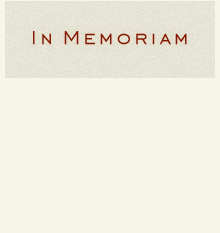Emdashes—Modern Times Between the Lines
The Basics:
About Emdashes | Email us
Ask the Librarians
Best of Emdashes: Hit Parade
A Web Comic: The Wavy Rule
Features & Columns:
Headline Shooter
On the Spot
Looked Into
Sempé Fi: Cover Art
Michael Jackson, 1958-2009
Filed under: In Memoriam Tagged: Garrison Keillor, In Memoriam, Jamaica Kincaid, James Lardner, Michael Jackson

Martin Schneider writes:
He didn't have anything to do with The New Yorker, of course. But it seems silly to try to ignore his death.
The first mention of Michael Jackson in The New Yorker that I could find is from July 14, 1975. It was in the Talk of the Town and it had two parts, both by Jamaica Kincaid (I think).
The first part is a report describing a press conference in which the Jackson family announced that it was leaving Motown to join Epic. The report emphasized the businesslike nature of the announcement: "No Jackson said anything sentimental."
On the same page appears a kind of fan letter, this one explicitly by Jamaica Kincaid, that intentionally echoes the kinds of fan letters he received every day—one of which is actually quoted, in full, in the item.
Such reports are full of heartbreaking things. Any reference to the color of his skin, the shape of his nose, the kinkiness of his hair, his affinity for children or animals, his marriage prospects—all of these things are heartbreaking, and Kincaid refers to all of them.
Possibly the most startling bit of information is that Jackson once appeared on The Dating Game. (It's true.)
In the July 9, 1984, issue, there is a whimsical, lightly acerbic Talk piece by James Lardner about the existence of a Michael Jackson Hotline.
In the March 14, 1988, issue, there is a tranquil Talk piece by Garrison Keillor (uncredited, in the issue) about observing Jackson rehearse a rendition of "Man in the Mirror" for the Grammy telecast. This one is not heartbreaking. This one is about Jackson in his element, as a supreme entertainer, and it emphasizes his confidence and ease among people.
I don't have much to say about him. I was never a fan in any real sense, but I admired the skill. He was a genius; he was damaged. Everyone knows it. A friend today asked me if he was the most famous person in the world. Was he? He might have been.
On the New Yorker blog, Ben Greenman gives his thoughts.



